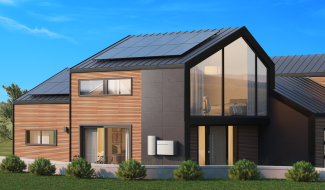Other Advantages of Solar-Powered Homes
With on-site, clean power generation a reality anywhere the sun shines, solar energy systems provide homeowners with several benefits beyond simply saving money.
Environmental Impact
Most obviously, a solar installation can help homeowners embrace a more sustainable lifestyle than traditional power sources. In areas where electricity is supplied by coal, natural gas, and other combustion-based energies, new solar-powered homes can reduce local greenhouse gas emissions.
As PV panels and systems operate completely emission-free, reductions in local pollution levels can indirectly translate into cleaner air and water. For this reason, to combat climate change, solar power generation at all capacities has been one of the prominent driving forces of international renewable energy development.
With sustainability at the core of our business, Enphase products have helped offset over 20.8 million metric tons of CO2e as part of solar installations in over 130 countries around the world.
Energy Independence
By replacing utility electricity with self-generated power, solar systems for homes directly lower a property’s dependence on grid-supplied energy.
However, it is important to recognize that ordinary grid-tied solar systems are not able to function without the support of local electrical infrastructure. Instead, homeowners can only achieve energy independence with the addition of IQ batteries for solar storage.
With continued access to electricity and self-sustaining power generation, homeowners with “solar plus storage systems” can be prepared for both short and prolonged grid outages related to weather, climate, wildfires, line maintenance, and more.
By adding an IQ Load Controller, homeowners can also conserve their energy by only powering life-sustaining appliances like refrigerators, lights, and necessary communication devices.
Of course, even when it is not an emergency, a battery and intelligent inverter enables homeowners to seamlessly switch between grid and self-produced power. With a smart energy management system designed to maximize self-consumption, homes can use the solar power produced and stored throughout the day both overnight and during time periods in which utility rates are higher.
Once thought to be too expensive to consider, the price of electric battery storage has lowered in recent years, and is expected to continue decreasing over the next few decades. And while adding a battery backup may increase initial project costs, designing and building an off-grid-ready solar-powered home is now more economically workable than ever.
Built for the Future
Looking into the future, widespread electrification and renewable energy development across all sectors is beginning to transform the energy grid as we know it.
As people, businesses, and large organizations work to achieve net-zero goals with fossil fuel deviations, electric vehicle sales are skyrocketing and more drivers are plugging in their cars, rather than heading to the gas station.
Here, residential solar panels and EV chargers go hand-in-hand. With rooftop power generation and home solar batteries, EV owners can literally charge their vehicles with the free and infinite power of the sun.
Plus, with smart management systems, homeowners can control their entire electric life – from charging vehicles, to powering the air conditioner and beyond. Smart-home ready and designed to help consumers make more informed energy choices, today’s advancements in residential solar technology empower homeowners to have complete control over their property’s power.


